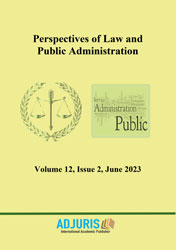Artificial Intelligence Towards International Regulations, Frameworks and Laws in the World of Globalization: Implications and Challenges
Artificial Intelligence Towards International Regulations, Frameworks and Laws in the World of Globalization: Implications and Challenges
Author(s): Anis BENABED, Lucica TudoranSubject(s): Law, Constitution, Jurisprudence, International Law, Labor relations, ICT Information and Communications Technologies, Globalization, Labour and Social Security Law
Published by: Societatea de Stiinte Juridice si Administrative
Keywords: globalization; AI; international; law; judge; global society; economy; future;
Summary/Abstract: This paper investigates, describes and presents the way and status artificial intelligence is having in the global society that bases on economy, politics, economy, culture and law, the judicious element that is law, the actors and representatives of justice and advocacy could face a threat with the substitution and incorporation of artificial intelligence that challenge the human being workforce in industry, occupations and services. The Global society has gone through a radical transformation socially, economically and culturally, especially after the fourth industrial revolution and digital revolution, meanwhile, it began to go through a number of ethical and legal challenges and risks. The appearance of internet, digitalization and artificial intelligence have given the world new insights, facilities in economy, communication and various aspects. The research question is “How may law or international law, the actors and representatives of justice and advocacy face the threat of artificial intelligence substitution?” the used methodology was literature review of the existing literature and qualitative descriptive analysis based on facts and some theories of law. The results show that many countries have established or started to implement artificial intelligence laws or regulations and some of them are published, in progress or already in force. In conclusion, as a reflection, lawyers should get trained with theoretical and practical technological knowledge that appropriate the new visions of the world, from a propositional and preventive role, if technology continues, it changes the paradigms of law from the automaton application.
Journal: Perspectives of Law and Public Administration
- Issue Year: 12/2023
- Issue No: 2
- Page Range: 268-274
- Page Count: 7
- Language: English

